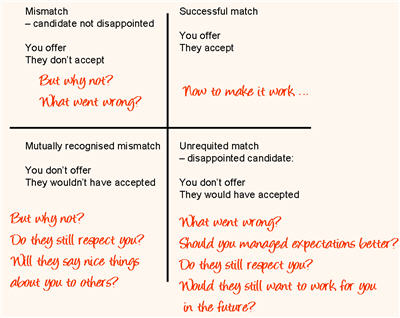No doubt you know that you can monitor what bloggers are saying about your company, either by buying a tailored service (say from Cyveillance, or Magpie) or by simply setting up Google Alerts.
But here’s a slightly different slant on it: what are your potential recruits saying about you to each other? What brand message is your careers site conveying?
The Career Mole is becoming increasingly established as a means for recruits to contact your employees to learn something about what it is really like to work for you – and perhaps to be referred via your existing employee as part of your employee referral system. This has benefits for you, the employer: it can reduce your recruitment costs and increase the quality of candidates (since they can self-select or be weeded out by your existing employee).
This discussion happens off-line, so this is, in effect, a very niche ‘dating agency’. But there are many, many forums dedicated to discussing job-hunting in specific industries, as well as a very new site at WikiJob (press release), which allows people to participate in a forum actively discussing named employers and what the interview process is like, right down to the level of ‘what questions do they ask’.
This may not be a problem, of course – potential recruits have always discussed interviews as part of the post-adrenalin-rush debrief thing. But what if they are saying something you wouldn’t want them to say?
This ought to be picked up by your brand alerting service, though it is up to you to check what is being said out there, and to decide how to react.
But have you thought about asking your job applicants directly for feedback?
AstraZeneca ask for feedback on the careers section of their corporate website … but actually, what you need is feedback on the entire recruitment process. British Airways explicitly say that they will ask for feedback on their own performance at the end of the selection process.
 |  |
| Astra Zeneca | British Airways |
The important thing to remember is that you will need the views not only of your successful applicants (that is, mutually successful in that you offer them a job – and they accept) but also of the unsuccessful ones.

The applicants who don’t take up a job with you will be brand ambassadors for you too … and there are likely to be more of them than there will be of the successful ones. These others will find jobs elsewhere – with your competitors, your customers, your suppliers.
Even those people who look at your site with a view to applying, but decide that they won’t even start the process are important … why did they decide not to apply at all? What put them off? Were they accurate in eliminating themselves from your recruitment pipeline?
It is important to ensure that all these different groups retain a positive impression of your company, even if they do not end up as employees.
Lucy is Editor at Corporate Eye